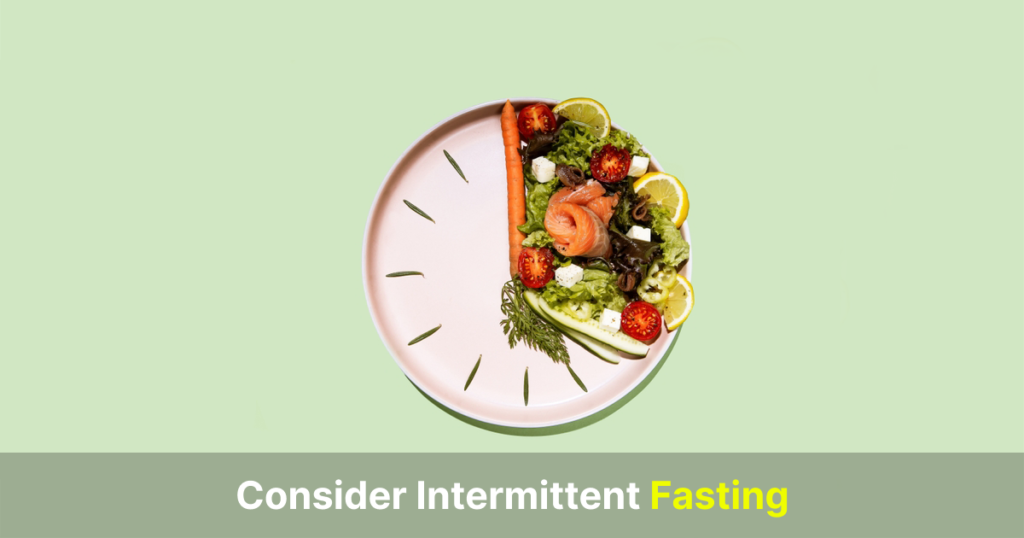It might be disheartening to reach a weight reduction plateau when on the keto diet. But do not worry; there are practical techniques to help you break through and continue your journey towards your goals.
Here’s a complete guide on overcoming the keto plateau.
1- Re-evaluate Your Macros

The need for macro adjustments often triggers a keto weight loss plateau. Individual requirements may differ from the usual keto ratio of 70% fat, 20% protein, and 10% carbohydrates.
Reasons:
- Insufficient Fat: If you don’t eat enough healthy fats, your body may not be in a deep enough state of ketosis. This may slow your weight reduction.
- Excessive Protein: Consuming too much protein can knock you out of ketosis because excess protein can be turned into glucose.
- Hidden Carbs: Be aware of hidden carbohydrates that can build up over time, such as those present in some condiments, sauces, and processed foods.
- Individual Needs: Activity level, body composition, and overall health can all impact your ideal macronutrient ratios.
How to Re-evaluate Your Macros:
- Track Your Intake
- Experiment Gradually
- Listen to Your Body
2- Track Your Calories

While keto is primarily concerned with macronutrients, measuring your overall calories can provide useful information, particularly when attempting to break through a weight loss plateau. Here’s why:
- Ensuring Adequate Intake: If you don’t eat enough calories, your body may enter famine mode, lowering your metabolism and impeding weight reduction.
- Preventing Overconsumption: Tracking calories will help you avoid overeating, which can contribute to weight gain or stall your progress.
- Identifying Patterns: Tracking your calorie intake allows you to spot any patterns or trends that may be affecting your weight loss.
How to Track Your Calories:
- Use a Food Tracking App
- Weigh and Measure Portions
- Be Mindful of Hidden Calories
- Adjust as Needed
3- Increase Physical Activity
 Increasing physical activity is an important tactic for breaking a weight loss plateau on the keto diet. Here is why:
Increasing physical activity is an important tactic for breaking a weight loss plateau on the keto diet. Here is why:
- Increased Calorie Burn: Regular activity helps you burn more calories, which aids in weight loss.
- Improved Metabolism: Regular physical exercise can enhance your metabolism, resulting in more fat burning even when you aren’t working out.
- Muscle Building: Strength training can help you gain muscle mass, which increases your metabolic rate and burns more calories.
- Stress Reduction: Exercise is an effective stress reliever, and lowering stress can aid weight loss.
Tips for Incorporating Physical Activity:
- Try to get in between thirty and sixty minutes a day of moderate-to-intense activity.
- Choose activities you enjoy
- Mix it up
- Gradually increase intensity and duration
- Don’t give up
4- Manage Stress

Stress has a substantial impact on weight loss efforts, especially the keto diet. Stress triggers our bodies to release cortisol, a hormone that encourages fat storage and heightens appetites.
Effective Strategies for Managing Stress:
- Practice mindfulness
- Engage in relaxation techniques
- Get enough sleep
- Exercise regularly
- Connect with others
- Set boundaries
- Seek professional help if needed
Additional Tips:
- Avoid caffeine and alcohol
- Eat a healthy diet
- Take breaks
- Find a hobby
5- Get Enough Sleep

Despite its importance, people sometimes overlook sleep as a crucial component of weight loss. When you’re well rested, your body runs smoothly, including its capacity to regulate hormones that influence appetite and metabolism.
Why Sleep is Essential for Weight Loss Plateau:
- Hormone Regulation
- Metabolism
- Stress Management
- Cognitive Function
Tips for Improving Sleep:
- Create a Sleep-Conducive Environment
- Establish a Consistent Sleep Schedule
- Limit Screen Time Before Bed
- Avoid Heavy Meals Close to Bedtime
6- Consider Intermittent Fasting

Intermittent fasting (IF) is the practice of alternately fasting and eating. When paired with a keto diet, IF may boost weight loss results.
How Intermittent Fasting Works:
- Increased Fat Burning: When you fast, your body may go into fat-burning mode, thus speeding up weight loss.
- Hormone Regulation: IF can help regulate hormones like insulin and leptin, which influence appetite and metabolism.
- Improved autophagy: Autophagy is a biological mechanism that removes damaged cells and promotes overall health. IF may stimulate autophagy.
Popular Intermittent Fasting Methods:
- Time-Restricted Feeding (TRF)
- The 5:2 Diet
- Alternate-Day Fasting
Consult a Healthcare Professional

While the keto diet can be effective for weight loss, it is critical to talk with a healthcare practitioner before making any significant changes to your diet or lifestyle.
Reasons to Consult a Healthcare Professional:
- Individualized Advice: A healthcare practitioner can offer advice tailored to your specific health needs, medical history, and aspirations.
- Monitoring for Side Effects: Some people may have side effects or negative reactions to the keto diet. A healthcare professional can look for any potential problems.
- Addressing Underlying Health Concerns: If you have any underlying health concerns, a healthcare professional can assist you in deciding whether the keto diet is safe and appropriate for you.
- Monitoring Progress: Regular check-ups with a healthcare practitioner can help you track your progress and make necessary changes to your diet or lifestyle.

